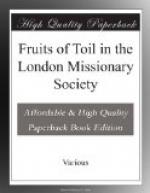IX.—SOUTH AFRICA.
In the course of their revision, the Directors found that the south Africa Mission needed at their hands an unusual amount of attention and care. Owing to peculiar circumstances, it had been to a considerable extent lost sight of for several years. At the outset of the inquiry, several questions of vital importance presented themselves for settlement. While the mission numbered on its staff thirty-five European missionaries, no less than twenty-one of these brethren were labouring in the christianized portions of the colony; where the native population has grown thinner rather than more numerous; and where the ministers and missionaries of other Societies have considerably increased. Only fourteen of the Society’s missionaries were labouring in the heathen territories, in Kafirland and among the Bechuana tribes.
The six mission estates, termed institutions, which for a series of years proved a valuable refuge to the Hottentot labourers, and trained them in habits of industry, have changed their character, with the improved position of public opinion and public law. They have long since accomplished their special work; and socially, in recent years, some of them have been doing evil rather than good. Again, the close relation subsisting between several of the missionaries and the Native Churches of which they were pastors, has operated much to the disadvantage of these brethren during the years of drought; and the system required readjustment without delay. The incomes of all the missionaries, especially of those within the Cape Colony, were insufficient, and the education of the young was in general very imperfectly provided for.
After careful consideration of the whole case, the Directors found themselves able to meet the numerous difficulties which it presented, and to shape out a system of management which may duly provide for these missions in the future, on definite and healthy principles. A series of resolutions was passed by the Board, embodying that system; and these were conveyed to the brethren in the mission, with a despatch which contained a full explanation of their views.
In considering the future of the Mission, the Directors remember that many christian agencies have been set at work in the Colony, in addition to their own, since they took up the cause of the Native tribes, and successfully fought the battle of their freedom. Some of these agencies have given especial attention to the European Congregations, to which the Society has never devoted its substantial strength; but amongst them the Natives also, especially in the eastern parts of the colony, have found pastors and friends. The time has therefore come to shift the Society’s labours more decidedly to those districts of South Africa which are still occupied by heathen tribes, and which have but few instructors. In the western parts of the colony our churches are few. In the neighbourhood of Port Elizabeth there is a cluster of important stations, which have exercised great influence for good over the Native races, and have brought many of their people into the Church Of Christ.




